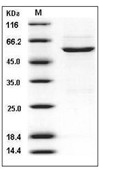 您的购物车当前为空
您的购物车当前为空
CDK4 Protein, Human, Recombinant (GST)
一键复制产品信息CDK4 is a member of the Ser/Thr protein kinase family. It is highly similar to the gene products of S. cerevisiae cdc28 and S. pombe cdc2. It is a catalytic subunit of the protein kinase complex that is important for cell cycle G1 phase progression. The activity of CDK4 is restricted to the G1-S phase, which is controlled by the regulatory subunits D-type cyclins and CDK inhibitor p16(INK4a). CDK4 was shown to be responsible for the phosphorylation of retinoblastoma gene product. CDK4 is the ser/Thr-kinase component of cyclin D-CDK4 (DC) complexes that phosphorylate and inhibit members of the retinoblastoma (RB) protein family including RB1 and regulate the cell-cycle during G(1)/S transition. Phosphorylation of RB1 allows dissociation of the transcription factor E2F from the RB/E2F complexes and the subsequent transcription of E2F target genes which are responsible for the progression through the G(1) phase. Hypophosphorylates RB1 in early G(1) phase. Cyclin D-CDK4 complexes are major integrators of various mitogenenic and antimitogenic signals. CDK4 has been shown to be mutated in some types of cancer, whilst a chromosomal rearrangement can lead to Cdk6 overexpression in lymphoma, leukemia and melanoma.Cancer ImmunotherapyImmune CheckpointImmunotherapyTargeted Therapy

CDK4 Protein, Human, Recombinant (GST)
一键复制产品信息| 规格 | 价格 | 库存 | 数量 |
|---|---|---|---|
| 5 μg | ¥ 366 | 3日内发货 | |
| 10 μg | ¥ 587 | 3日内发货 | |
| 20 μg | ¥ 962 | 3日内发货 | |
| 50 μg | ¥ 1,890 | 现货 | |
| 100 μg | ¥ 3,210 | 5日内发货 | |
| 200 μg | ¥ 5,500 | 5日内发货 | |
| 500 μg | ¥ 11,100 | 5日内发货 |
产品信息
| 生物活性 | No Kinase Activity |
| 产品描述 | CDK4 is a member of the Ser/Thr protein kinase family. It is highly similar to the gene products of S. cerevisiae cdc28 and S. pombe cdc2. It is a catalytic subunit of the protein kinase complex that is important for cell cycle G1 phase progression. The activity of CDK4 is restricted to the G1-S phase, which is controlled by the regulatory subunits D-type cyclins and CDK inhibitor p16(INK4a). CDK4 was shown to be responsible for the phosphorylation of retinoblastoma gene product. CDK4 is the ser/Thr-kinase component of cyclin D-CDK4 (DC) complexes that phosphorylate and inhibit members of the retinoblastoma (RB) protein family including RB1 and regulate the cell-cycle during G(1)/S transition. Phosphorylation of RB1 allows dissociation of the transcription factor E2F from the RB/E2F complexes and the subsequent transcription of E2F target genes which are responsible for the progression through the G(1) phase. Hypophosphorylates RB1 in early G(1) phase. Cyclin D-CDK4 complexes are major integrators of various mitogenenic and antimitogenic signals. CDK4 has been shown to be mutated in some types of cancer, whilst a chromosomal rearrangement can lead to Cdk6 overexpression in lymphoma, leukemia and melanoma.Cancer ImmunotherapyImmune CheckpointImmunotherapyTargeted Therapy |
| 种属 | Human |
| 表达系统 | Baculovirus Insect Cells |
| 标签 | N-GST |
| 蛋白编号 | P11802 |
| 别名 | PSK-J3,cyclin-dependent kinase 4,CMM3 |
| 蛋白构建 | A DNA sequence encoding the human CDK4 (NP_000066.1) (Met 1-Glu 303) was fused with the GST tag at the N-terminus. Predicted N terminal: Met |
| 蛋白纯度 | > 80 % as determined by SDS-PAGE  |
| 分子量 | 60 kDa (predicted); 55 kDa (reducing conditions) |
| 内毒素 | < 1.0 EU/μg of the protein as determined by the LAL method. |
| 蛋白性状 | Lyophilized powder |
| 缓冲液 | Lyophilized from a solution filtered through a 0.22 μm filter, containing 50 mM Tris, 100 mM NaCl, 10% gly, 0.5 mM PMSF, pH 8.0.Typically, a mixture containing 5% to 8% trehalose, mannitol, and 0.01% Tween 80 is incorporated as a protective agent before lyophilization. |
| 复溶方法 | A Certificate of Analysis (CoA) containing reconstitution instructions is included with the products. Please refer to the CoA for detailed information. |
| 存储 | It is recommended to store recombinant proteins at -20°C to -80°C for future use. Lyophilized powders can be stably stored for over 12 months, while liquid products can be stored for 6-12 months at -80°C. For reconstituted protein solutions, the solution can be stored at -20°C to -80°C for at least 3 months. Please avoid multiple freeze-thaw cycles and store products in aliquots. |
| 运输方式 | In general, Lyophilized powders are shipping with blue ice. |
| 研究背景 | CDK4 is a member of the Ser/Thr protein kinase family. It is highly similar to the gene products of S. cerevisiae cdc28 and S. pombe cdc2. It is a catalytic subunit of the protein kinase complex that is important for cell cycle G1 phase progression. The activity of CDK4 is restricted to the G1-S phase, which is controlled by the regulatory subunits D-type cyclins and CDK inhibitor p16(INK4a). CDK4 was shown to be responsible for the phosphorylation of retinoblastoma gene product. CDK4 is the ser/Thr-kinase component of cyclin D-CDK4 (DC) complexes that phosphorylate and inhibit members of the retinoblastoma (RB) protein family including RB1 and regulate the cell-cycle during G(1)/S transition. Phosphorylation of RB1 allows dissociation of the transcription factor E2F from the RB/E2F complexes and the subsequent transcription of E2F target genes which are responsible for the progression through the G(1) phase. Hypophosphorylates RB1 in early G(1) phase. Cyclin D-CDK4 complexes are major integrators of various mitogenenic and antimitogenic signals. CDK4 has been shown to be mutated in some types of cancer, whilst a chromosomal rearrangement can lead to Cdk6 overexpression in lymphoma, leukemia and melanoma.Cancer ImmunotherapyImmune CheckpointImmunotherapyTargeted Therapy |





 |
|